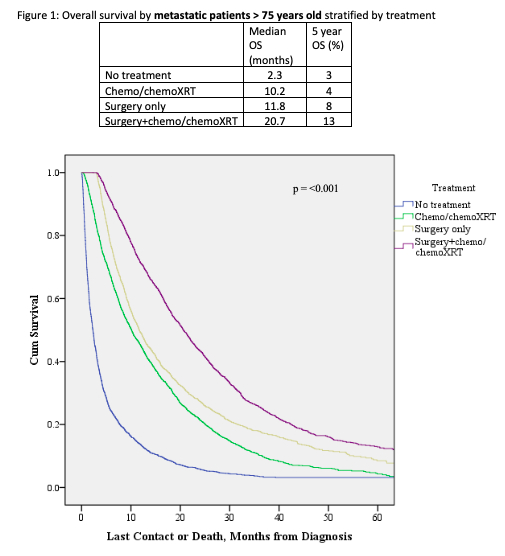SURGICAL OUTCOMES AND MORTALITY IN ELDERLY PATIENTS DIAGNOSED WITH COLORECTAL CANCER
Darrel Gachette*1, Renee Williams1, Jamie Huston2, Kafayat A. Busari2, Oliver Stewart1, Kenneth L. Meredith2
1NYU Langone Health, New York, NY; 2Sarasota Memorial Health Care System, Sarasota, FL
Introduction: The American Cancer Society has reported that the relative survival rates at 1 and 2 years for tumors diagnosed at distant stages have increased across all age groups. Despite these trends older patients are less likely to receive surgical resection, adjuvant chemotherapy or radiotherapy given concern for poor performance status and decreased survival. We aimed to compare surgical outcomes and mortality in colorectal cancer patients over 75 year old compared to patients aged 50 to 75.
Methods
Data were analyzed from the National Cancer Database between 2010-2014. Results were divided into two categories (50-75 year old, >75 year old) and included: number of patients, comorbidity score, treatment, mortality and survival rate. Patient characteristics and survival were compared with Mann-Whitney U, Pearson's Chi-square, and the Kaplan-Meier method.
Results:
167,059 patients were included in the analysis. 113,955 patients in the group aged 50-75 years, and 53,104 patients age >75 years. In patients > 75 years, 88% had a Charlson comorbidity index of 0-1 compared to 93% in patients ages 50-75 (p<0.001). In patients >75 years, 92% had R0 resections, compared to 91.5% in patients aged 50-75 (p=.002). The median number of lymph nodes removed in patients >75 was 14 compared to 15 in patients aged 50-75(p<0.001). The mean number of positive lymph nodes were 1.7 in patients >75 compared to 1.9 in patients aged 50-75 (P<0.001). While significant, these differences represent a small effect. 30 and 90 day mortality were significantly higher in the older age group at 6.4 and 11.2 percent, respectively (p<0.001). In patients over 75 years with metastatic disease, the overall survival at 5 years was 25 percent with any intervention and 13% with surgery, chemotherapy, and radiation (p<0.05).
Conclusion
Patients >75 years old showed equivalent outcomes in terms of: R0 resections, lymph nodes resected, and lymph nodes positivity when compared to those aged 50-75. Though mortality rates were greater in the older age group, the 5-year survival in patients with advanced disease with any intervention were significant. Given the equivalent outcomes, older patients with colorectal cancer should be considered for more aggressive treatment.

Back to 2021 Abstracts
